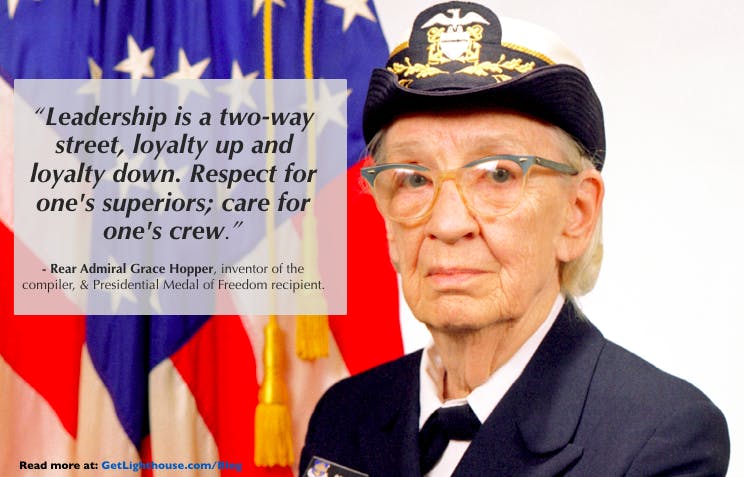Did you see the news this week? No, not that trial, not the bill, not the sportsball draft, not the war...okay, actually there's too much news to follow.
I wouldn't blame anyone for tuning it all out.
But there was some news that matters to managers; the FTC ended non-competes across the United States.
For some of you that's a pretty big deal, which is why in today's edition we tackle that topic, in addition to a lesson in going too far in trying to be employee friendly, a special offer next week only, a new post on talking about strategy with your team, and more.
Let’s dive in…
Table of contents:
- 🥘 Food for Thought on Going too far for Your Team Members
- 📰 News & Reports for Managers on the End of Non-Competes?
- 🔜 Next Week it's time to Master Managing Up to Your Boss
➡️ Did a friend forward this to you? Get every issue straight to your inbox by signing up here.
Note: This is a preview of our weekly leadership newsletter, Lighthouse Leadership Weekly (LLW).
To get this sent to your inbox every week, along with our latest long form essays on this blog, you can sign up here.
🥘 Food for Thought
“You must care deeply about your people, but not what they think about you.” - Dick Costolo, former CEO of Twitter, founder and investor
I saw this tweet from a friend this week and it reminded me of the essential lesson from Dick Costolo quoted above. Here's what my friend said:
I used to think that taking care of your people first would take care of the business. That almost killed my business.
— ericosiu (@ericosiu) April 23, 2024
First, let's do a review of what I allowed:
1. Mental Health Days and Summer Fridays + generally a very lax day off policy
There's nothing wrong with taking…
If you don't want to click through to the full story, the TLDR is that he tried to be super nice and accommodating to his team, promoting people and being hands off, all to a fault.
They took advantage of his generosity, stopped taking good care of customers, and the company took a hard hit because of it.
As he put it, "This level of thinking almost killed my business, and I was ultimately responsible for it all."
“You must care deeply about your people, but not what they think about you.”
It comes down to what Dick Costolo said so well. And you need *BOTH*.
“You must care deeply about your people, but not what they think about you.”
— Jason Evanish (@Evanish) April 23, 2024
This is the best short form video on how to lead I’ve ever seen. I’ve been sharing it with friends for years: https://t.co/jwCsfldvgG
Caring deeply about your people means things like:
- Building rapport with them and taking an interest in them as humans
- Creating psychological safety so your team speaks up when there are problems and is willing to share bold ideas
- Making reasonable accommodations when people need them and things come up that are bigger than work
Yet, you also have to *not* care what they think about at you. This means:
- Holding your team to a high standard that you enforce and reward
- Turning around or letting go of low performers, serious rule breakers, and people that hurt your business or team
- Being willing to have hard conversations, make difficult or unpopular decisions, and do what's best for your customers and business.
Doing both of these can be difficult and scary. Most people are only good at one or the other, yet to be a truly great leader, you *must* master the balance of both.
But what I say here is the tip of the iceberg. So much of our content on the blog and newsletter is to help you with small pieces of each side at different times.
And a great place to start is take ~6 minutes and listen to Dick's talk here:
📰 News & Reports for Managers
📌 Non-competes have been eliminated by the FTC. Are you ready?
In case you missed it, the FTC ruled this week that non-competes are unenforceable nation-wide.
A few states, like California, already invalidated them years ago, while in other places like Massachusetts, who has had very militant enforcement of them (to the point laid off employees had to leave the state to get a job) will have some serious adjusting to do.
I won't pretend to know how this may play out in courts, but we should assume that at least in the near term any non-competes your business relies on will not be enforceable.
Let's talk about what that means.

If you don't have a non-compete anymore, how do you keep your team?
Cutting to the chase, this is the real question that matters. If you operate in a business or field where you're used to them, you need to start thinking about how you can adapt.
Here's a few ways you can start thinking about and strategizing to avoid losing good employees to competitors or them starting a competing business with you:
- Make them want to stay: This should be the first and most obvious thing to do. With a very big stick no longer available, adding a few more carrots to incentivize people wanting to stay is a good move. Typically these are things like work flexibility, accommodating reasonable requests, career growth and financial upside, and a positive culture.
- Make it convenient to stay: If your biggest fear is people striking out on their own and taking clients with them, then the best way to keep your best people is to make sure that they recognize all the things you do for them. My father's accounting firm handled all kinds of tedious back office issues for his staff for exactly this reason.
- Let them leave if they want, but learn why: Mike Tomlin likes to say, "we like volunteers, not hostages" and that's as true at work as it is a pro football team. If someone wants to leave, take the time to really listen and understand why. You'll likely learn things that can help you retain other people, or even change their mind.
- Welcome people back if they boomerang: One of the strongest signs that the grass is *not* greener is when someone comes back after leaving. Assuming the returning team member is a positive addition, it can be a morale boost for them to return and share why your workplace is better.
- Listen to your team! No one knows better what your team needs, or what's wrong with your culture as well as your own team. If you're worried about retention with Non Competes gone, the best thing you can do is talk with your executives, peers, and team members and see what consensus you can find for things to change.
The truth is, there are no silver bullets. If your industry is used to having strongly enforced non-competes and now you don't, you and your competitors all face the same challenges.
However, by recognizing that your industry is about to change, you can get ahead of these challenges and start making changes to your policies, culture, and management habits.
How are you handling the end of non-competes? I'd love to hear your thoughts.
🔜 Starting Monday, join us to Master Managing Up, next week only
How is your relationship with your boss?
Is it everything you hoped it could be?
Or is it a bit of a struggle, with a lot of uncertainty about where you stand, or whether you can get what you and your team want and need from them?
There is a better way.
You can improve your relationship with your manager.
As you've learned with your team, you have the power to transform your relationships with them by the actions you take, the questions you ask, and the example you set.
The same is true for your relationship with your manager.
And that's why we've put together this special program to help you master how you manage up to your manager.
Join us for Mastering Managing Up and master your most important relationship
In today's economy, with layoffs, cutbacks, and pressing goals, you cannot afford to have any doubts about your relationship with your manager.
It could be the difference between you or a team member staying or going, getting a good project or a dead end, and whether you can get the things you want to pound the proverbial table for.
Let us help you transform your relationship with them.
Whether you want to take your relationship from good to GREAT, or turn things completely around for poor to solid, this program is for you.
We'll have more information coming during the week, but if you want to get the best price, and learn more about the program right now, you can check out all the program details and reserve your spot now here.
>> Sign up now for Lighthouse Lessons: Mastering Managing Up here.
If a friend sent this to you, sign up here to get this newsletter every Saturday morning: https://getlighthouse.ck.page/9aa103e62f
PS: How's your relationship with your manager? Learn how you can improve it here.
Sign up to get this newsletter & our latest blog posts straight to your inbox:




